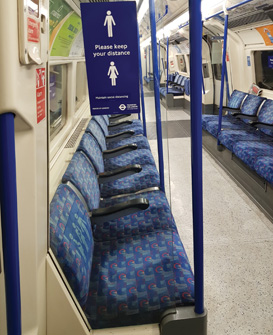Ever since the first UK lockdown, imposed in March, began to be lifted in June, the dilemma for the authorities – whether in retail, on public transport, and in public generally – has been; how to enforce guidance and coronavirus law for people’s own good, if a small but persistent minority does not want to abide by it, however foolishly? asks Mark Rowe.
Gradually the police have become more assertive in their policing of social distancing, which is only guidance rather than law. As featured in the November 2020 print edition of Professional Security magazine, in practice in shopping malls for instance it has been security officers who have been managing queues outside shops and face mask-wearing compliance indoors, while police have been on foot patrol or in vehicles, to respond in 999 cases, firefighting style; mirroring the urban centre policing pre-pandemic, when security officers keep the basic peace and call on police (who may or may not respond promptly, or at all) in cases of detained shop thieves and the like.
Also featured in the November issue, British Transport Police (BTP) and Transport for London (TfL) announced, in a significantly less friendly tone in October, that officers would penalise the ‘selfish minority’ who did not correctly wear a face mask on Tube, buses or trains, as required since June.
That gradual toughening of stance reflects that everyone knows what to do by now. The dilemma however is what sort of policing do British police and allied agencies such as TfL and local government want to provide; policing by consent, as traditional since Sir Robert Peel days, or – at the risk of further leading to physical and verbal abuse, already greater than pre-pandemic, according to the NPCC stats – look to impose fines? In a largely anonymous society where the bobby on the beat seldom knows who’s in front of him – and no longer exists anyway – is unable to use discretion, whether to give a ticking off or hand out a fixed penalty notice based on background circumstances; that was the same pre-pandemic for traffic offences.
A further ratcheting up of the ante was Derbyshire Police’s highly publicised deployments at reservoir car parks and National Trust property parklands and the like, to fine people who had travelled for exercise. That however raised the grotesque unfairness that someone could be fined for driving to a beauty spot, even though they socially distanced at all times, while unpunished and untracked was someone enjoying leisure by going from one supermarket or garden centre to another.
Derbyshire Police and Crime Commissioner (PCC) Hardyal Dhindsa seemed to acknowledge this in a statement that ‘it would appear that the force has been a little over-zealous in its interpretation of the guidance’. He said he had spoken to Derbyshire Chief Constable Rachel Swann, ‘who has told me that an urgent review is under way to establish exactly the circumstances in which these Fixed Penalty Notices were issued. If it transpires that these notices were issued in error then I would expect them to be rescinded.’
That back-tracking spoke volumes about what Hardyal Dhindsa called an ‘operational issue’; the balance between police trying to do the right thing by getting the public to do the right thing, and punishing people for breaching the spirit of the covid rules, rather than the actual rules. Yet this is only the pandemic equivalent of a bread and butter ‘operational issue’ for police of judging how to deploy resources, whether against fraud and scams (the number one volume crime, although studiously ignored by the National Police Chiefs Council (NPCC) ever since the pandemic, when it has reported lower crime, leaving out fraud. Where are police to deploy finite resources, and (not quite the same thing) be seen to be deploying them – against lifestyle crimes such as the illegal drugs trade, arguably a public health issue; economic crimes such as modern slavery; highly emotive crimes such as child sexual exploitation (including historic abuse cases) even though they are investigation-intensive; or volume crime such as theft against businesses, and frauds?
The January print edition of Professional Security set out, not for the first time, shortcomings of the official reporting centre Action Fraud (still stating on its website, ten months after lockdown, that its contact centre can only provide a ‘reduced service’, while food retail, banking and so on appears to manage business as usual) whereby only complicated, cross-border, no matter how large, frauds are not picked up by police. Likewise if, as anyone can see anecdotally, traffic is greater on roads that during the first lockdown, how can police credibly enforce any law if it is being widely broken?
Photo by Mark Rowe; London Underground, tier 4, pre-Christmas.









